Dental Crowns Burbank
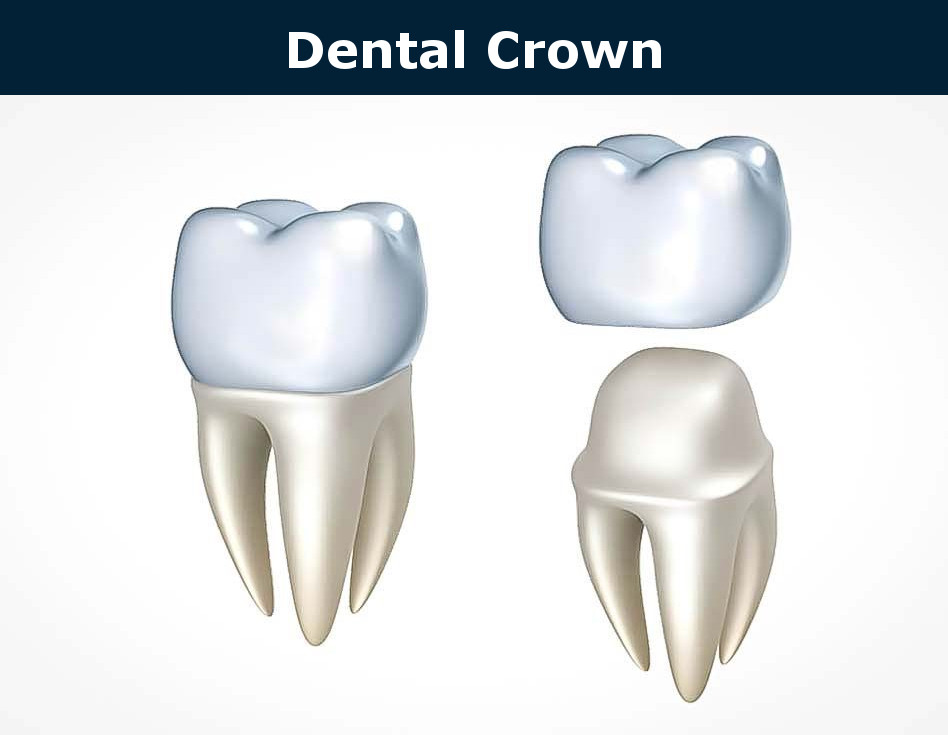
Dental crowns Burbank are a type of restoration that covers the visible part of the tooth from all sides. It is fixed with special cement. The crown becomes the tooth’s new surface, so it restores the original shape of the tooth.
Dental crowns can be created from different materials and are used to improve the appearance or the strength of a tooth.
Dental crown helps to restore a severely damaged tooth. It helps the tooth regain its old form and function, and subsequently protects the tooth from cavities. Modern dentistry offers not only reliable, but also aesthetic, orthopedic constructions that meet your demands.
What Is a Dental Crown?
A dental crown is a tooth-shaped cap that is placed over a tooth. Burbank dental crowns are used to restore teeth that have been severely destroyed by cavities, is broken, cracked, or discolored.
In addition, crowns are used:
- to restore the anatomical shape;
- to restore the function of the tooth;
- to strengthen the tooth;
- to improve the aesthetic appearance of the tooth.
Why Is a Dental Crown Needed?
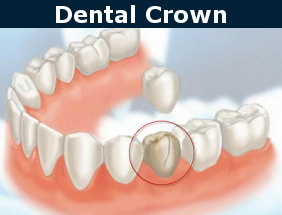
The dental crown is placed in order to preserve the further destruction of bone tissue and restore the chewing function. Dental crowns help maintain proper bite and play an aesthetic role.
A dental crown may be needed in the following situations:
- When the tooth is injured mechanically
- For preservation from decay after removal of pulp
- With pathological thinning of the enamel coating
- For cosmetic concealment of natural defects
- To cover a dental implant
- To keep a dental bridge in place
- To make a cosmetic change.
When Are Dental Crowns Used by Our Dentists in Burbank?
Our dentists in Burbank may recommend a dental crown in order to:
- Substitute a large filling if there is not enough tooth left;
- Cover a discolored or a badly shaped tooth;
- Cover a tooth which suffered a root canal treatment;
- Prevent a weak tooth from fracturing;
- Restore a broken tooth;
- Cover a dental implant.
Types of Dental Crowns
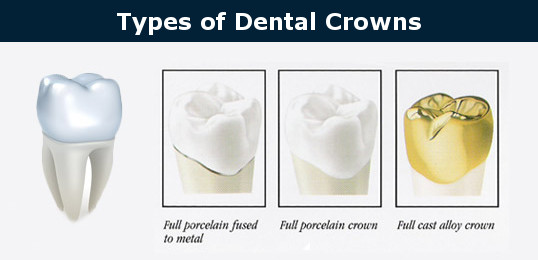
Dental crowns are divided into types according to the material from which they are made:
Dental crowns can be:
- Stainless steel crowns: These are prefabricated and used as temporary measures on the permanent teeth. This type of crown covers the whole tooth, preventing it from more decay. It can be used on adults as well as children in certain conditions. For children, this crown is often used to fit over a primary tooth that’s been prepared to fix it. The crown covers the whole tooth and saves it from further destruction. Stainless steel crowns are used for children’s teeth because they don’t demand multiple dental visits to put in place and are more cost-effective.
- Metals utilized in dental crowns may consist of alloys like cobalt-chromium or nickel-chromium alloys. Metal crowns rarely break or chip. They can handle chewing and bites. These are probably the most durable. However, the metallic color is the main downside. Therefore, they are more appropriate for molars which cannot be seen.
- Gold alloys: Gold is a soft metal, so you can achieve a very accurate fit of the crown. Since the gold crowns are completely metallic, they withstand chewing and biting. They do not form chips. Gold crowns are very rarely broken. Gold crowns are very strong, but nevertheless, they wear with the same speed as natural tooth enamel. Therefore, the gold crown does not cause additional wear to the next tooth. All-metal gold crowns are usually placed on teeth that are not visible when smiling.
- Porcelain-fused-to-metal dental crowns: The inner part of the crown is made of metal. The upper and most sensitive part is made of ceramic materials. The color can be chosen to fit the other teeth. However, they are not as durable as the metal ones. This crown is suitable for prosthetics of all groups of teeth, both chewing and front.
- All-resin dental crowns: These crowns are less costly, even though they wear down in time and are more likely to fracture;
- All-ceramic or all-porcelain crowns: They offer a better natural color match compared to all other dental crowns. One of their main advantages is transparency, which makes these the most attractive in cosmetic terms. They have a natural appearance, although they are weaker than other types of crowns. All-ceramic or all-porcelain crowns are virtually indistinguishable from natural teeth, but their serious drawback is increased fragility. They can be utilized for both front and back teeth;
- Temporary or permanent: Temporary dental crowns can be created at a My Dentist Burbank. Most of the permanent ones are made in a dental laboratory. Temporary crowns are made of stainless steel or an acrylic-based material. You can also be given a temporary crown until a permanent one is created by the laboratory.
Installing the Dental Crown on the Tooth
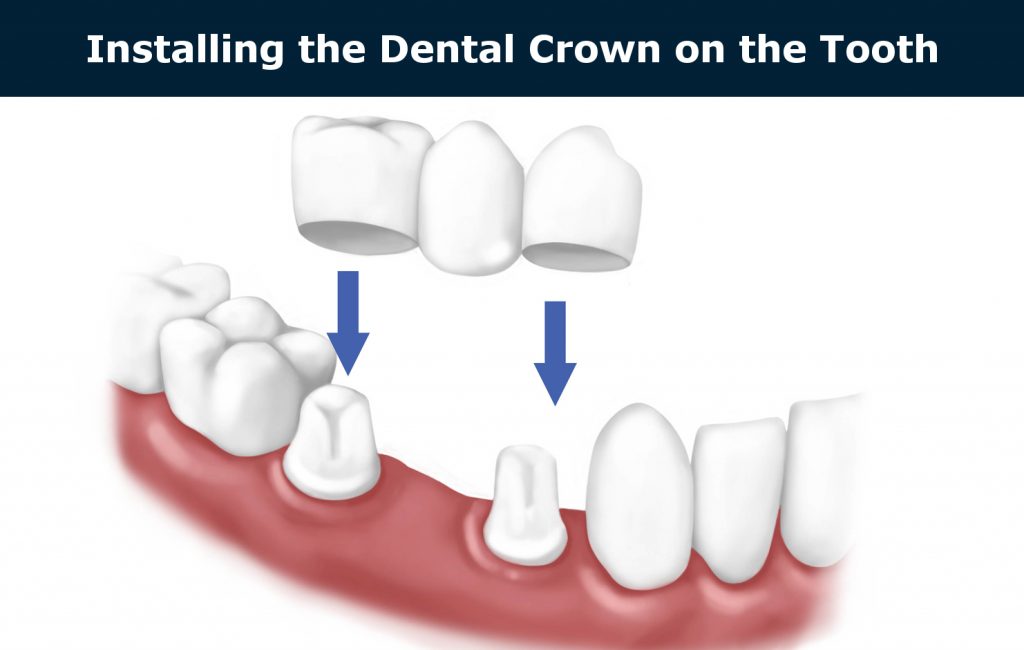
The tooth crown is fixed for one tooth in several stages.
Diagnostics. Visual examination of the tooth by the Burbank dentist is an obligatory part of the treatment. After that, an X-ray of the tooth is taken. Only after this are patients offered the most effective and high-quality materials for making crowns.
Treatment. The necessary treatment is carried out. Most likely, it is necessary to remove the nerve under the crown and to make the canal filling.
Sharpening of teeth for crowns. If the tooth tissue is slightly destroyed, then the remaining walls are ground. In the case where the tip of the tooth is completely absent, the dental insert for the crown is also installed, which will ensure its reliable fixation. Previously, instead of a tab, a pin was installed. Today, the dental crown on the pin is considered an outdated technique with a number of complications leading to tooth loss.
Manufacturing of dental crowns. After carrying out all preparations, the cast is removed and sent to the dental laboratory.
Installation of dental crowns. Then the product is fitted onto the tooth and installed. Orthopedic structures are planted on a special cement, allowing the prosthesis to hold for a long time.
All changes are carried out for several visits. Producing dental crowns is possible within a few hours, provided that the necessary equipment is available.
How Long Do Dental Crowns Last?
Dental crowns last on average between 5 and 15 years. The lifetime of the crown depends on how well they are made and cared for. Crown prices depend on the material used and the amount of work.
Care of Dental Crowns
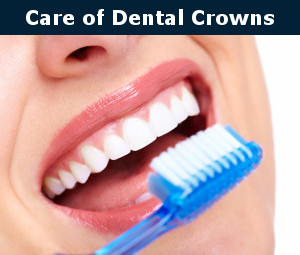
Dental crowns are distinguished by their high strength and perfectly smooth surface, which does not stick to plaque or remains of food. Nevertheless, it is important to take care of crowns the same way you take care of your natural teeth. Particular attention and maximum care should be given to the teeth which are located next to the crowns.
Care for crowns from cermets should be the same as for the rest of the teeth. Colored drinks and cigarettes can change their color.
- First of all, you should brush regularly with a suitable toothpaste.
- After each meal, rinse your mouth thoroughly.
- For the jaw, which consists of prostheses, additional measures are needed to clean foreign bodies from under the prosthetic teeth, as well as care for the gums. The irrigator will help clean the mouth if the foreign body gets stuck between the tooth and the cermet. The irrigator should be used at least 2-3 times a week to maintain the condition of natural teeth and to provide preventative action against dental diseases.
- By the way, crowns and natural teeth are made of cermets. Cermets do not like too hot or too cold food and drinks, as this can cause cracking of artificial enamel.
So, even the most expensive surgery can not guarantee healthy and beautiful teeth without proper care. Care for artificial dental structures is not difficult. And do not forget that prevention and proper care will cost you much less than the cost of treating dental diseases.
Dental crowns serve as an excellent version for the restoration of stained, misshapen, or crooked teeth. If you or a family member have any of these problems and need dental crowns, please get in touch with our friendly staff for a complimentary consultation with one of our dentists in Burbank. Call 1-818-578-2332 for an appointment.


